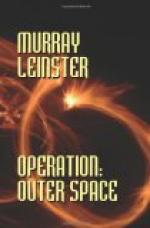“This is your seat, Mr. Cochrane,” she said professionally. “I’ll strap you in this first time. You’ll do it later.”
Cochrane lay down in a contour-chair with an eight-inch mattress of foam rubber. The stewardess adjusted straps. He thought bitter, ironic thoughts. A voice said:
“Mr. Cochrane!”
He turned his head. There was Babs Deane, his secretary, with her eyes very bright. She regarded him from a contour-chair exactly opposite his. She said happily:
“Mr. West and Mr. Jamison are the science men, Mr. Cochrane. I got Mr. Bell as the writer.”
“A great triumph!” Cochrane told her. “Did you get any idea what all this is about? Why we’re going up?”
“No,” admitted Babs cheerfully. “I haven’t the least idea. But I’m going to the moon! It’s the most wonderful thing that ever happened to me!”
Cochrane shrugged his shoulders. Shrugging was not comfortable in the straps that held him. Babs was a good secretary. She was the only one Cochrane had ever had who did not try to make use of her position as secretary to the producer of the Dikkipatti Hour on television. Other secretaries had used their nearness to him to wangle acting or dancing or singing assignments on other and lesser shows. As a rule they lasted just four public appearances before they were back at desks, spoiled for further secretarial use by their taste of fame. But Babs hadn’t tried that. Yet she’d jumped at a chance for a trip to the moon.
A panel up toward the nose of the rocket—the upper end of this passenger compartment—glowed suddenly. Flaming red letters said, “Take-off, ninety seconds.”
Cochrane found an ironic flavor in the thought that splendid daring and incredible technology had made his coming journey possible. Heroes had ventured magnificently into the emptiness beyond Earth’s atmosphere. Uncountable millions of dollars had been spent. Enormous intelligence and infinite pains had been devoted to making possible a journey of two hundred thirty-six thousand miles through sheer nothingness. This was the most splendid achievement of human science—the reaching of a satellite of Earth and the building of a human city there.
And for what? Undoubtedly so that one Jed Cochrane could be ordered by telephone, by somebody’s secretary, to go and get on a passenger-rocket and get to the moon. Go—having failed to make a protest because his boss wouldn’t interrupt dinner to listen—so he could keep his job by obeying. For this splendid purpose, scientists had labored and dedicated men had risked their lives.
Of course, Cochrane reminded himself with conscious justice, of course there was the very great value of moon-mail cachets to devotees of philately. There was the value of the tourist facilities to anybody who could spend that much money for something to brag about afterward. There were the solar-heat mines—running at a slight loss—and various other fine achievements. There was even a nightclub in Lunar City where one highball cost the equivalent of—say—a week’s pay for a secretary like Babs. And—




